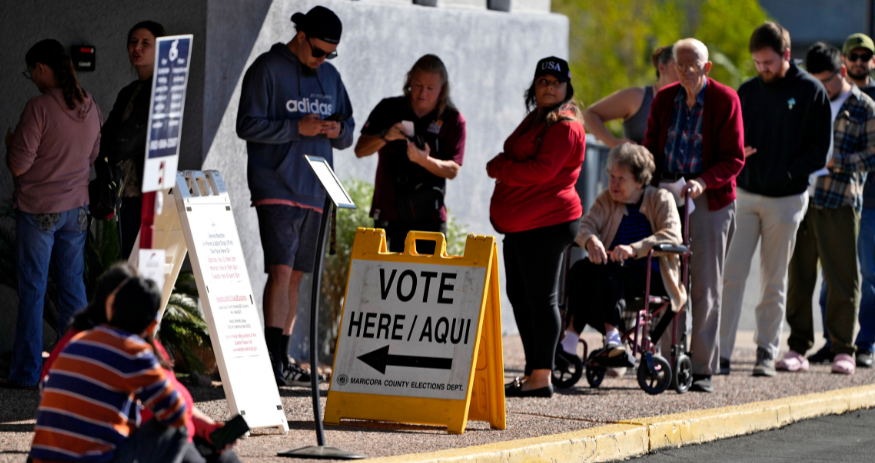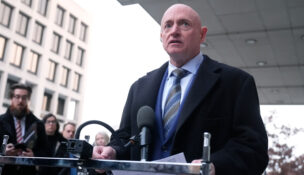Arizona Supreme Court to weigh in on election manual makeover
Kiera Riley Arizona Capitol Times//October 14, 2025//
Arizona Supreme Court to weigh in on election manual makeover
Kiera Riley Arizona Capitol Times//October 14, 2025//
Key Points:
-
State high court weighs whether EPM must follow Administrative Procedures Act
-
Republicans argue EPM lacks exemption from full administrative process
-
State warns compliance could complicate election administration statewide
The Arizona Supreme Court is now weighing whether to require the creation of the Elections Procedures Manual to comply with the state’s statutory rulemaking scheme.
In argument today, justices delved into how, or whether, the law requiring an election rulebook every odd year collides or conflicts with the Administrative Procedures Act.
The Secretary of State maintains that the creation of the EPM is self-contained, with a process already defined in state law. In contrast, the Republican National Committee, the Republican Party of Arizona and the Yavapai County Republican Party contend there is no exemption from a more intensive process prescribed to agencies in the APA.
Arguments today were the culmination of a long legal battle over the 2023 Elections Procedures Manual.
In early 2024, following the approval of the EPM, the Republican National Committee, Republican Party of Arizona, Yavapai County Republican Party and a voter sued, initially alleging a violation of the Administrative Procedures Act, given a failure by Secretary of State Adrian Fontes to offer a 30-day public comment period.
The superior court initially rejected the claim, finding the statute governing the EPM independently assigned procedures for promulgating the elections guidebook.
But, in March, the Arizona Court of Appeals ruled the EPM must be brought into compliance with the state’s laws on administrative rulemaking and found the 2023 manual to be invalid due to the failure to provide a 30 day public comment period.
Under the APA, the Secretary of State would have to publish a notice of proposed rulemaking, accept public comment for at least thirty days, and hold oral proceedings on provisions upon request, with an additional 30 day notice. The process would start again if any substantial changes come about.
And, before finalizing the EPM, the secretary would have to submit it to either the Governor’s Regulatory Review Council or the attorney general within 120 days after public comment closes.
Fontes appealed to the state high court, claiming that crafting an EPM under the APA would be a difficult, if not impossible, feat, given the requirements for drafting a manual on Oct. 1 of every odd-numbered year.
In arguments today, Justice Clint Bolick asked Solicitor General Joshua Bendor to what extent Secretary of State Adrian Fontes has followed the APA in putting together the 2025 EPM.
Bendor said Fontes took the principal step of extending the public comment period to 30 days to address the central issue raised by the Arizona Court of Appeals.
Justice William Montgomery then asked where in statute the secretary maintains the authority to take public comment under the EPM statute.
“If we’re going to read these statutes in such a way as to be very clear about what must and must not be done, what do we do with actions taken under 16-452, that aren’t required or aren’t provided for that we find within the APA?” Montgomery said.
Bendor noted there was no explicit guidance beyond consulting with counties, leaving it to Secretaries of State to decide best practices in consultation and public comment.
Justice Kathryn King asked whether the lack of a requirement for public comment could pose a constitutional concern by cutting off the public’s ability to provide comment, but Bendor noted the constitutional concern did not change the statutory analysis at hand.
Justice Maria Elena Cruz then inquired about the practical impact of requiring APA compliance.
Bendor said it would be “especially problematic” for smaller counties with more limited election staff and noted the APA requirement for additional rounds of public comment could shrink counties’ input in the EPM.
“The Secretary of State spends a tremendous amount of time consulting with the counties throughout the year, chapter by chapter, oral feedback, written feedback, talking to them about the public comment, really trying to do a document that’s helpful to them,” Bendor said. “That would be harder under the respondents’ interpretation.”
He said the attorney general and the governor could also see their roles diminished due to a lack of time to make substantial changes without the 30 days of public comment. And under the APA, Bendor said the Governor’s Regulatory Review Council would then have “tremendous authority over election law.”
In turning to the RNC, AZGOP and Yavapai County GOP’s argument, Bolick pressed attorney Christopher Murray on the EPM’s specific dates, which differ from APA procedures.
“Aren’t these really just two ships sailing separately in the night?” Bolick asked.
Murray said the APA would have to trump the EPM timeline under state law.
“There is no conflict between 16-452 and the APA,” Murray said. “There is inconvenience.”
Murray urged the court to consider how the EPM has grown in the public consciousness and in scope in terms of the law.
“The EPM does a whole lot more now than it ever did. And the EPM, by doing a whole lot more, affects the rights of far more people than it ever did before, and it affects far more questions around election law,” Murray said. “So I would say that sort of development actually points to, well, why? Why does the APA need to apply this? Right? Because it’s essentially a 260 page manual of laws of general applicability.”
In rebuttal, Bendor said requiring the EPM to come into compliance with the APA would “pose significant risks of harm and confusion to the administration of elections in Arizona,” and said he did not believe the plaintiffs “grappled with the risks that their arguments pose.”
Timmer then asked, “Are we to grapple with the risks? A lot of this is policy. If the Legislature wants to have APA and the EPM, that’s really not for us to say that that’s a poor idea.”
Bendor said the court must consider it, noting the EPM’s aim at the“uniform and correct administration of election law.”
The justices took the matter under advisement.
As arguments are being considered, the 2025 EPM is under review by Attorney General Kris Mayes and Governor Katie Hobbs. And as the 2025 EPM becomes fully realized, tinges of potential legal challenges have started to pop up.
The Secretary of State began the process in February this year with county election staff, reviewing the EPM chapter-by-chapter on a monthly basis and releasing the first draft in August.
Over the course of a 30-day public comment period, the office received 800 comments from 74 groups and consulted with county and tribal officials, lawmakers and voting rights advocates, resulting in a total of 28 changes to the draft.
Edits include updating footnotes to reflect more recent court rulings — like ensuring strict compliance with laws for petition circulators and clarifying proof of citizenship requirements for state and federal-only voters. The draft also expands eligible disability agencies to assist in voting, adds additional points of consultation with tribal officials and clarifies and conforms language closer to statute.
The 2025 EPM considered one legislative recommendation regarding petition circulators but does not include several requested changes, particularly the proof of citizenship requirements.
House Speaker Steve Montenegro and Senate President Warren Petersen took issue with a provision purportedly allowing county recorders to cure registrations where they have found evidence that an applicant is not a citizen.
Legislative leaders instead recommend the EPM require county recorders to cancel registrations and refer applications to the attorney general and county attorney for further investigation.
And in a similar vein, the two also flagged a provision empowering recorders to attempt securing proof of citizenship on a registrant’s behalf. They wanted to strike a provision that made a lack of DPOC an “invalid ground” to challenge an early ballot.
The Arizona Free Enterprise Club shares much of the same qualms and adds a note on a piece that allows the county recorder to visually inspect passports, as opposed to making and maintaining a copy for at least two years.
Any additional changes to the 2025 EPM will now come through edits by Attorney General Kris Mayes or Gov. Katie Hobbs, or by litigation after the draft becomes final.
Mayes, Hobbs and Fontes have until Dec. 31 to approve the final 2025 EPM.














































